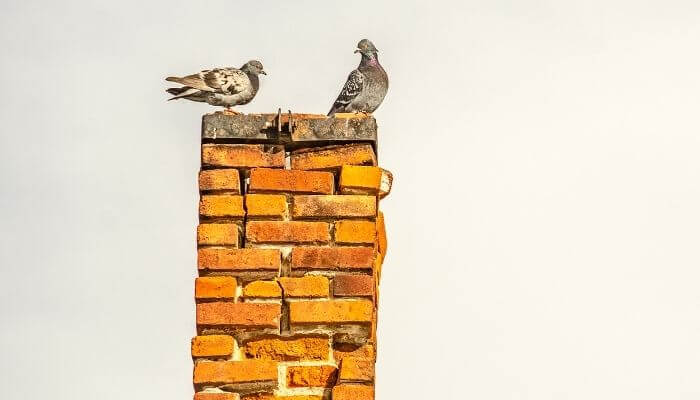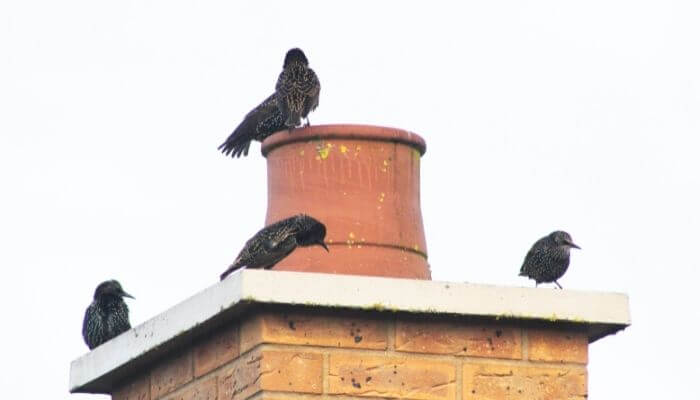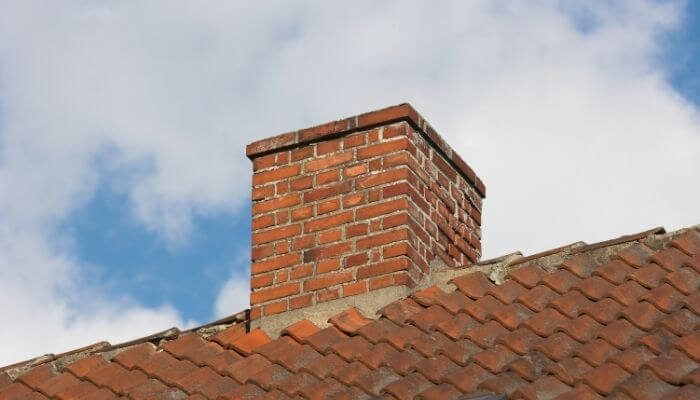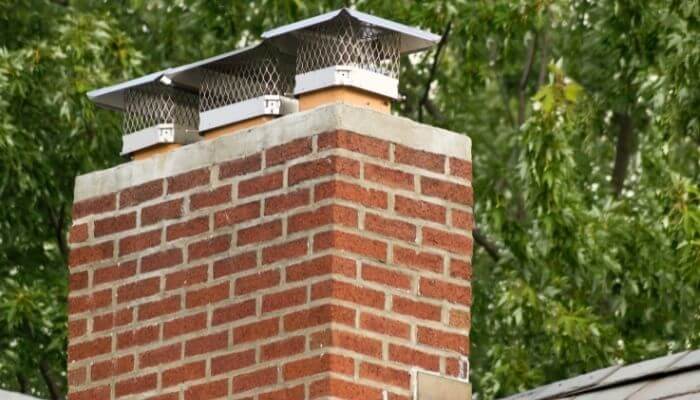Unfortunately, birds routinely get stuck in a chimney because they are looking for food, comfort or warmth.
If you’re not aware a bird is there and do not get it out then the bird is likely to die in the chimney within a week.

For this reason, it’s important to get the bird out as soon as you realize it’s there.
Even if you can’t save its life, you can prevent other problems from happening as a result of a clogged chimney. Use this guide to help you along the way.
Why Do Birds Fly into Chimneys?
Many times a bird will make its way into your chimney because it’s warm and the weather outside is cold. Sometimes birds will use a chimney as a place to build a nest and lay its eggs.
They may find insects in the chimney and will continue visiting as a reliable food source. They may also be seeking safety and shelter from predators.
Many times the birds will move in and out of the chimney without a problem. But in some cases, they will get stuck and could die.
Problems Caused by Birds in Chimneys
Apart from a potential imminent death of a trapped bird, problems can be caused by nests.
A nest may cause blockages, chimney fire, infestation or damp through the build-up of condensation.
This can happen to a chimney even if the hearth it serves is not in use.
How to Tell if There’s a Bird in Your Chimney
Before you decide what to do about it, you should confirm that there’s actually a bird trapped in your chimney.
If you have a chimney for an open fire, there might be an obvious sign such as a cloud of soot accompanied by distress calls, or you might notice nest debris in your hearth.
However, many original fires have been blocked up while the chimney remains open so the soot cloud may simply lodge behind the wall/board.

Even if you can’t see a bird, chances are you’ll hear it trying to get out. This might be screeching or chirping, but you might also hear scratching and scraping.
If you notice a sudden gathering of flies or a foul odour, you might have a bird that has already died in your chimney.
You may wonder why, if birds can fly, why can’t they simply fly out.
The bird may be injured or if the bird has fallen in by mistake (maybe from falling out of a nest or a nest collapsing), there may not be enough space for the bird’s wings to open sufficiently to enable flight.
How Long Can a Bird Survive in the Chimney?
As long as you don’t light a fire, a bird can likely survive for up to a week in your chimney. That could be anywhere from two days to seven days.
There are a couple of reasons why a bird will eventually die:
- Thirst – because of a bird’s metabolism, it needs water regularly or it will become dehydrated and eventually die. The length of time this takes depends on the bird.
- Hunger – birds also need food to live and if they are stuck in the chimney without enough, they will eventually perish.
Chances are that if a bird becomes stuck in your chimney, it will struggle to find a way out.
The more effort it puts into trying to escape, the more quickly it will become weak and tired. This exhausted state may cause death.
If the bird hangs on longer than expected, it’s probably because it’s getting fresh air and has a food and water source.
This may be a human taking care of the bird until the right person can come and rescue it.
What You Should Do If There’s a Bird in Your Chimney
It is always best to call an expert to get the bird out of your chimney – this may be an animal rescue expert or a chimney sweep.
They are trained and have the right tools to get the job done.
If you must attempt it on your own, start by removing any debris from the chimney, as well as the chimney coverings.

Then cover up any light, except for one source to draw the bird out. Gently tap on the chimney to coax the bird to move toward the light.
Under no circumstances should you light a fire to try to smoke the bird out. If a nest has fallen into the chimney with the bird, it could cause a very damaging chimney fire. Most nesting materials are very flammable.
Keep in mind that there is a risk of injury if you do this yourself.
That includes you and the bird. You may be scratched or pecked, which can lead to an infection. The bird may hurt itself in an attempt to get away.
Be prepared to call a rescue center if you end up with a hurt bird or the doctor if you wind up injured.
Will There be a Smell?
If the bird dies inside your chimney, you might wonder will it smell?
Smaller birds aren’t likely to create an odor as their body fluids dry up quickly. Larger birds are likely to begin to smell after about three days.
This odor can be hard to remove, even once the bird is gone.
If you get birds in your chimney often, you need to take steps to correct the issue, so you don’t have to deal with the smell.
How to Keep Birds Out of Your Chimney
There is a greater risk of birds falling into your chimney if they use it as a nesting site. Under the Wildlife and Country Act in the UK, it is illegal to remove a nest during nesting season which for most birds is March to August.
Similar rules apply to nest removal in the USA.
To avoid falling fowl foul of the law, the best thing to do is prevent your chimney from being used as a nesting site.
One of the best ways to avoid dealing with a bird trapped in your chimney is to keep them out in the first place. A chimney cap is a great way to keep birds from keeping birds out.

A professional can help you choose the right one for your needs and can install it for you as well.
Closing the flue can also help keep birds out.
These preventative measures are a lot easier to do than trying to remove a bird from your chimney.
It’s a solution that will keep any and all birds out, rather than repeatedly having to get help getting them out.
Having a bird trapped in your chimney isn’t a fun problem to have but there are ways to keep it from happening again.
If you have a bird stuck in your chimney, call the experts to help you get it out.
This is the best way to ensure that the bird isn’t harmed during the process and keeps you safe as well.
